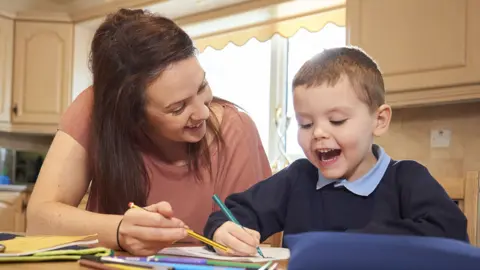Primary school offer day: How do I appeal my child's place?
 Getty Images
Getty ImagesParents of children starting primary school in England, Wales and Scotland this September have been told which school has offered them a place.
Offer day was 9 April in Northern Ireland, and 16 April in England, Scotland and Wales.
But how do you appeal if the news wasn't what you wanted?
How do I appeal against a primary school place?
In England, you have at least 20 school days from offer day to submit an appeal, which consists of sending off a form and then attending a hearing with an independent admissions panel.
The letter you receive notifying you of the decision should tell you exactly what to do.
The panel will consider a number of factors, including class size limits and whether the school's admissions arrangements were followed correctly.
It is recommended that you still accept the offer your child did receive, even if you want to appeal against the decision. This is to ensure that at least one place is available if the appeal is unsuccessful.
In Wales, you can also challenge the decision during an appeal hearing, which will examine the arguments from both sides.
In Scotland, your appeal may be heard before an appeal committee, including councillors or other local people such as teachers and parents.
Those wanting to appeal in Northern Ireland should go to the Education Authority website, where you can send off a form.
After you have appealed, an independent admissions appeal tribunal decides if the school has correctly applied its admissions criteria.
How do I find out my child's place?
On the day you get the offer, your letter, email or notification should tell you what to do next.
In England, a parent or carer has to formally accept the offer by the given deadline.
In Wales, the local authority or school will give you a start date and any other information you need. You might also have to return a slip to say you intend to take the offer.
In Scotland, some councils will ask for a reply to the offer to confirm the place.
In Northern Ireland, those who applied online in January were able to log in to the online portal and get information on their child's primary one application from 9 April.
 Getty Images
Getty ImagesHow many children apply for each place?
There were 4,564,000 children in state nurseries and primary schools in England and Wales in 2024, according to annual statistics published by the Department for Education.
The projected data for 2025 is expected to see that fall by 42,000 to 4,522,000.
In 2023, birth rates - which have been falling for several years - hit an all-time low in England and Wales. It was a similar picture in Scotland, and it is expected that trend will continue at least for the next few years.
Primary schools are closing, or merging with neighbouring schools, across the country because of falling birth rates, but some areas are more badly affected than others.
Research from the Education Policy Institute suggests that, at a council level, Lambeth in London will see the biggest drop in primary school pupils by 2028, followed by the Isle of Wight and then Brighton and Hove. But there are some places where numbers are actually expected to grow - in Central Bedfordshire, Cambridgeshire and Leicestershire, for example.
Overall, fewer children should mean places are easier to come by - but that will vary depending on where you live.
How are primary school admissions decided?
In England and Wales, children in care, or who have been in care before, have to be given top priority.
After that, schools and local authorities have their own admissions criteria to decide which children to prioritise.
That can include:
- Living near the school
- Having a sibling at the school
- Being from a particular religion (for faith schools)
Your local council can give you more information about a particular school or authority's criteria.
Parents who missed the application deadline may have to wait until after the first round of offers before they find out where their child has a place.
In Scotland, councils assign primary school places based on catchment areas, or how far away from a school a family lives. In some cases, parents can put in a placing request for a different school which should be approved as long as there are places.
 Getty Images
Getty ImagesWhat about children with special education needs and disabilities?
If your child has special educational needs and disabilities (SEND) in England and has an Education, Health and Care Plan (EHCP) which specifies a school, that school must give them a place.
Most children with SEND, however, do not have an EHCP, and their entry criteria is treated the same as children without SEND.
In Wales, children with additional learning needs (ALN) will have an Individual Development Plan (IDP), maintained by a school, college or local authority.
In Northern Ireland, there is a separate application process for children with a SEND statement.
In Scotland, local authorities work with parents to identify the best option.

Are you a parent who got their first choice? Or will you be appealing? Share your experiences by emailing [email protected].
Please include a contact number if you are willing to speak to a BBC journalist. You can also get in touch in the following ways:
- WhatsApp: +44 7756 165803
- Tweet: @BBC_HaveYourSay
- Upload pictures or video
- Please read our terms & conditions and privacy policy
If you are reading this page and can't see the form you will need to visit the mobile version of the BBC website to submit your question or comment or you can email us at [email protected]. Please include your name, age and location with any submission.
